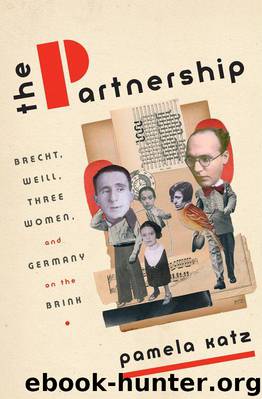The Partnership: Brecht, Weill, Three Women, and Germany on the Brink by Pamela Katz

Author:Pamela Katz
Language: eng
Format: mobi, epub
ISBN: 9780385534925
Publisher: Knopf Doubleday Publishing Group
Published: 2015-01-05T16:00:00+00:00
CHAPTER 11
The Beginning of the End
Five months after the opening of The Threepenny Opera, Weill was standing before the grand Kroll Opera House, score in hand, taking in the sight of its lavish gardens, relishing the opportunity to hear his music presented under the virtuoso baton of Otto Klemperer. Invoking a tradition going back to Mozart, Weill had composed an instrumental suite based on Threepenny’s original score. For although he had enjoyed the dance-band and hit-tune versions of his songs—he was always delighted to hear that his music could live and breathe in an amateur’s whistle—Weill also wanted to establish its classical prowess. It was one thing to be popular and another to be “only” popular.
Brecht, meanwhile, was still struggling to justify his popular success. He came quietly back to Berlin, his extensive period of Marxist study nearly complete, and wondered how to lure his newly acquired broad audience into a politically engaged theater. His future plays, he hoped, would combine the excitement of a boxing match with the insights of Das Kapital. But he had yet to finish Fatzer, his antiwar play, and was impatient to leap back into action. Upon his return to the city, he was therefore delighted to hear that Ernst Josef Aufricht was planning to mount several politically explicit works.1 Having moved the successful Threepenny to another theater for several months, the recently flush producer was able to afford a few intrepid and risky projects. Brecht suggested a very left-wing play he had encouraged his ex-lover Marieluise Fleisser to write, Pioneers of Ingolstadt, a follow-up to Purgatory in Ingolstadt, which Brecht had directed three years earlier. When Aufricht agreed to mount it, Brecht quickly invited himself into the production. Fleisser welcomed his participation, for although her affair with him had ended shortly after they worked on her first play, there was still a great deal of mutual professional respect between them.2
Brecht was most adventurous when he felt secure in his surroundings. He quickly treated the Schiffbauerdamm as his theatrical Kraal—an extension of his attic on Spichernstrasse. He reveled in his return to a familiar space, an old lover, a good play, and the chance to work with his regular colleagues, including Lenya, Caspar Neher, and the actress Carola Neher. He completely dominated the production, rewriting and interfering in the direction as well. He ended up with a co-director credit.
Pioneers was a strong antiestablishment play that would have been provocative enough even without Brecht’s influence. But eager to create the kind of uproar he so enjoyed, Brecht pushed Fleisser to write several daring new scenes, including one where three schoolboys explicitly discuss the female anatomy. He also directed the actors to be quite graphic in their depiction of the already sexually frank scenes. One notably shocking encounter took place in the bushes. Since one of the main characters is a soldier who enjoys several liaisons with the servant girls around the town of Ingolstadt, and the army in general is portrayed in a harshly critical light, military officials objected ferociously to the play.
Download
The Partnership: Brecht, Weill, Three Women, and Germany on the Brink by Pamela Katz.epub
This site does not store any files on its server. We only index and link to content provided by other sites. Please contact the content providers to delete copyright contents if any and email us, we'll remove relevant links or contents immediately.
| Acting & Auditioning | Broadway & Musicals |
| Circus | Direction & Production |
| History & Criticism | Miming |
| Playwriting | Puppets & Puppetry |
| Stage Lighting | Stagecraft |
Call Me by Your Name by André Aciman(20473)
Ready Player One by Cline Ernest(14620)
How to Be a Bawse: A Guide to Conquering Life by Lilly Singh(7459)
Wiseguy by Nicholas Pileggi(5753)
The Kite Runner by Khaled Hosseini(5158)
On Writing A Memoir of the Craft by Stephen King(4921)
Audition by Ryu Murakami(4914)
The Crown by Robert Lacey(4793)
Call me by your name by Andre Aciman(4668)
Gerald's Game by Stephen King(4628)
Harry Potter and the Cursed Child: The Journey by Harry Potter Theatrical Productions(4487)
Dialogue by Robert McKee(4376)
The Perils of Being Moderately Famous by Soha Ali Khan(4204)
Dynamic Alignment Through Imagery by Eric Franklin(4200)
Apollo 8 by Jeffrey Kluger(3694)
The Inner Game of Tennis by W. Timothy Gallwey(3659)
Seriously... I'm Kidding by Ellen DeGeneres(3621)
How to be Champion: My Autobiography by Sarah Millican(3578)
Darker by E L James(3507)
